Iron in Baby Cereal: Best Uses, Safety, and the Importance of Iron
Curious about iron in baby cereal? Discover its best uses, safety tips, and why it's vital for your little one's growth and development.
Updated May 31, 2024

Iron is a very important nutrient throughout the lifespan, and particularly for developing babies. One of the easiest ways to make sure your baby is getting enough of this mineral is by adding iron-fortified baby cereal to their diet once they’ve weaned to solid foods.
However, iron-fortified baby cereal isn’t recommended for all babies. Plus, many parents have questions about the type and safety of iron added to baby cereal. Here’s what you need to know about getting enough iron for your baby, and whether iron-fortified baby cereal is a good option.
» Ensure essential nutrients! Try this iron-fortified infant cereal for balanced nutrition
What is iron?
Iron is a mineral that’s naturally found in soil and in many foods. It’s also added to certain supplements and fortified foods, such as breakfast cereals and baby cereals.
It’s important to get enough iron because this nutrient plays a critical role in the transportation of oxygen throughout the body. It’s an essential component of hemoglobin, a protein in red blood cells that moves oxygen from the lungs to all of the tissues of the body. Iron is also a component of myoglobin, a muscle protein that provides oxygen, and is, therefore, also involved in keeping muscle cells healthy.
Iron is especially important for babies' neurological development, physical growth, production of some hormones, and maintenance of cellular health.
There are two forms of dietary iron: heme and non-heme. Heme iron is found in animal-derived foods, such as meat, poultry, and seafood. On the other hand, non-heme iron comes from plant foods, such as beans, peas, lentils, soy, tomatoes, nuts, and leafy greens.
» Ensure iron intake! Learn about the importance of iron and other essential nutrients for kids
How much iron does my baby need?
Babies store iron before birth to meet their needs early on. After 4-6 months, they require additional iron from their diet to avoid deficiencies. Lack of iron can affect brain function and growth, especially in premature babies or those born to iron-deficient mothers.
Symptoms of low iron include slowed growth, pale skin, and irritability. Recommended daily iron intake varies by age, starting at 0.27 mg for 0-6-month-olds and increasing to 11 mg for 7-12-month-olds.
While plant-based diets don't inherently raise iron deficiency risks, it's more common in kids not consuming animal products. Plant-based iron absorption rates are lower, influenced by compounds like oxalates and phytates. Despite this, diverse iron-rich plant foods are essential for a balanced diet in babies, including grains, leafy greens, nuts, and seeds.
» Discover iron-rich foods for your child's healthy growth
How much iron is in infant cereal?
Iron-fortified baby cereals are a simple way to meet your baby's iron needs during weaning. Rice cereal, a common choice, is iron-fortified, though arsenic levels can vary. Oat and multi-grain options offer alternatives. These cereals are ideal for babies transitioning from breast milk or formula, as they provide iron in small servings. They're particularly beneficial for exclusively breastfed babies, as formula already contains iron.
In a 4 tablespoon (14 gram) serving of iron-fortified baby cereal, you’re likely to find at least 45-60% of your baby’s daily needs for iron or around 5 mg.
» Support their development! Check out this iron-fortified baby cereal for optimal growth
Is iron in baby cereal safe?
Iron-fortified baby cereal is a safe and effective way to provide infants with the iron they need if other supplemental sources are not available. However, it's not recommended for formula-fed babies, as formula already contains iron, and excess iron intake can be harmful. Exclusively breastfed babies can benefit from iron-fortified cereal around 6 months of age, as breast milk is naturally low in iron. Offering this cereal helps meet the iron needs of breastfed babies transitioning to solid foods.
» Find out is rice baby cereal safe and iron-fortified
How to boost iron absorption
To ensure your baby gets enough iron, incorporate iron-rich foods into their diet, regardless of whether they're breastfed or formula-fed. Pairing these foods with vitamin C-rich options enhances iron absorption.
Examples of vitamin C sources for babies include tomatoes, citrus fruits, bell peppers, raspberries, and strawberries. Serve them alongside iron-fortified baby cereal, adapting the preparation method for your baby's age. For instance, pureeing or softening foods for younger babies or adding a few drops of orange juice to baby cereal. Offering iron and vitamin C-rich foods multiple times a day is crucial for meeting your baby's needs, especially if they don't take a daily multivitamin or iron supplement.
» Discover effective strategies to boost iron levels during the first 1000 days of life
Other plant-based sources of iron for babies
Offering iron-fortified baby cereal during your baby's first year is advisable for a consistent iron supply. However, as your baby gets accustomed to eating, introducing whole food sources of iron is important. While animal-derived foods like meat, poultry, seafood, and eggs are commonly recommended for iron, plant-based diets can also provide sufficient iron
Some of the best plant-based sources of iron for babies include:
- Hummus: 1 mg of iron in 3 Tbsp
- Tofu: 2.5 mg of iron in 2 ounces
- Sprouted grain bread: 1 mg of iron in 1 slice
- Spinach: 3 mg of iron in ½ cup cooked
- Kidney beans: 2 mg of iron in ½ cup
- Lentils: 3 mg of iron in ½ cup cooked
- Tomatoes: 2 mg of iron in ½ cup canned and stewed
- Quinoa: 1.5 mg of iron in ½ cup cooked
- Green peas: 1 mg of iron in ½ cup
- Chickpea or legume pasta: 3 mg of iron in 1 ounce
The Takeaway
Iron is crucial, especially in an infant's first year. While babies have enough iron from utero for the initial months, it's vital to provide alternative sources afterward. Formula-fed babies receive sufficient iron from the formula and shouldn't need fortified baby cereal. However, exclusively breastfed babies can benefit from iron-fortified baby cereals daily as they explore solid foods. Both breastfed and formula-fed babies should also be given plenty of iron-rich whole foods.
For weaned toddlers who may benefit from additional dietary sources of iron, Else Nutrition Toddler Formula provides 55% of a toddler’s daily iron needs per serving.
Else Super Cereal for babies 6+ months is coming in January!
Frequently Asked Questions
What's the recent concern regarding baby cereal and magnetic particles?
Recent headlines, sparked by viral videos on the internet, have some parents concerned over whether they’re feeding their baby magnetic cereal - and if this is unsafe.
The concern stems from someone who posted a video of placing a magnet over their infant’s baby cereal and purportedly pulling out metal particles. From here, other people tried the same experiment and found similar results.
Why do some people find magnetic particles in baby cereal, and is it safe?
According to baby cereal manufacturers, including well-known and respected names like Gerber, the dark magnetic particles found in these are in fact added iron.
Fortifying baby cereals with iron means adding essential particles like this, and the reason people can pull them out with a magnet is that iron is a naturally magnetic metal.
Furthermore, the American Academy of Pediatrics has supported the use of iron fortification for infant formulas and baby products for decades due to the critical roles of this nutrient in a baby’s growth and neurological development.
Does iron-fortified cereal cause constipation?
While large doses of iron can promote constipation in developing digestive tracts, the amount of iron in fortified baby cereals is generally unlikely to cause this issue for most babies.
Additionally, the type of iron used in baby cereals is meant to be easily digestible, further minimizing the risk for constipation.
If your baby is experiencing constipation that doesn’t go away, it’s best to speak with your child’s pediatrician or dietitian to examine potential causes and make adjustments where needed.
What kind of iron is in baby cereal?
The kind of iron used to fortify foods is non-heme iron, which is the same type found in plant-based foods. On the ingredients list, it may be listed as ferrous sulfate or potentially “Electrolytic Iron”.
The iron used in baby cereal has been added for the purpose of easily helping you meet your baby’s daily needs. It does not change the flavor or texture of the baby cereal.








